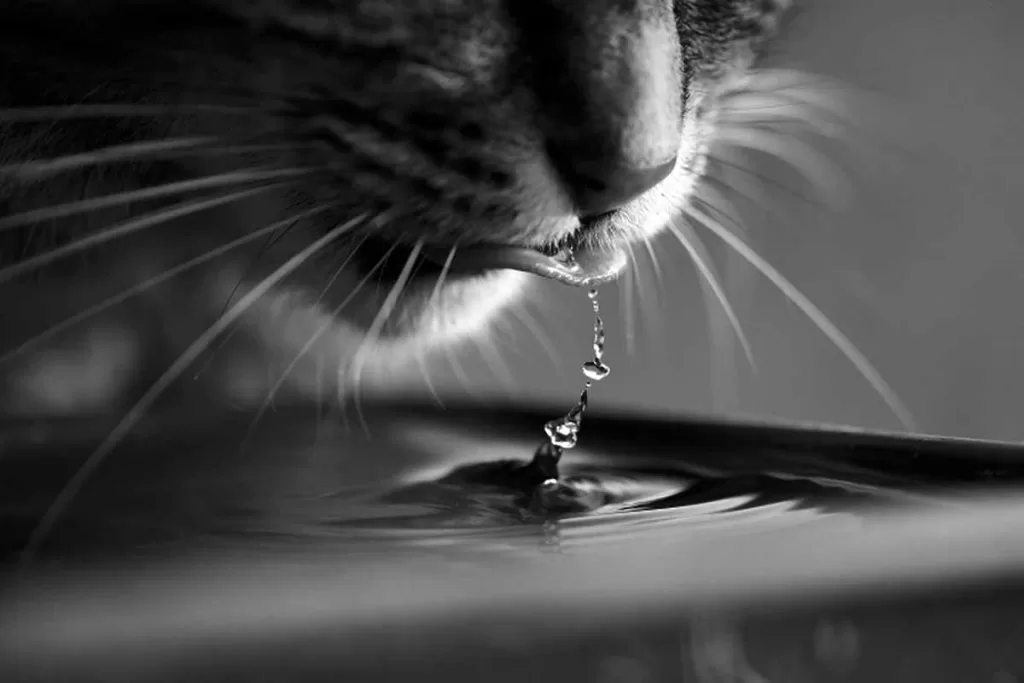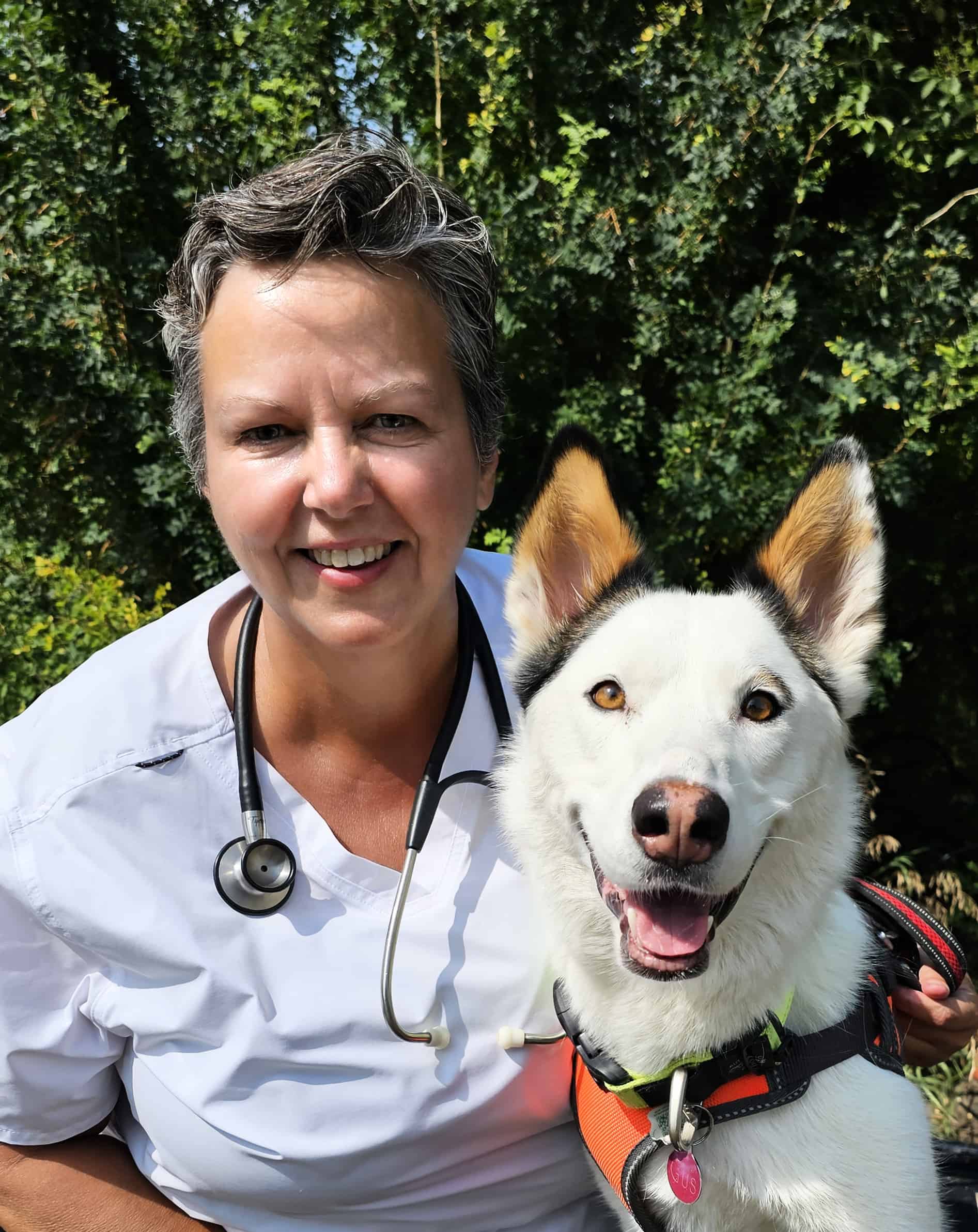Do you ever find yourself refilling your cat’s water bowl multiple times a day? Is the amount of water your cat is drinking more than what seems normal? If so, there may be an underlying health issue behind it.
Cats may drink water more than normal due to medical conditions such as kidney disease, diabetes, hyperthyroidism, Cushing’s disease, or liver disease. It can also be to replace fluids lost by vomiting, diarrhea, sweating, or panting. Cats with polydipsia should be taken to a veterinarian.
Finding out why your cat is drinking excessively could save their life, which is why today we are diving deep into understanding why cats drink too much and how to safely tackle this concern.
Read on to learn more about potential causes of abnormal drinking levels in cats!
What Is Considered Excessive Thirst In Cats?
Polydipsia in cats refers to excessive thirst that leads to a prolonged increase in their water intake beyond what is typical for their size and age. Before we can determine what excessive thirst is, we have to know what normal water consumption is.
How Much Water Should A Cat Drink In 24 Hours?
A cat that is otherwise healthy should be consuming between 3.5 to 4.5 ounces of water per five pounds of body weight per day. The amount of water a cat needs may differ based on various factors like age, diet, activity level, and environment.
For example, a cat that is eating only dry kibble is going to need to drink more water than a cat that eats wet food. Also, very active cats need to drink more than inactive cats, and cats in hot climates need more water than cats in cool climates.
If your cat is drinking a lot more water than usual, it could indicate that there is a medical issue that needs to be evaluated by a veterinarian.
Why Is Water Essential For A Cat’s Health?
Water is essential for a cat’s health for several reasons:
- Hydration: Proper hydration helps maintain fluid balance and can prevent conditions like urinary tract infections, constipation, and kidney disease.
- Temperature regulation: Water helps to regulate a cat’s body temperature by allowing heat to be released through panting and sweating.
- Digestion: Cats need water to digest and absorb nutrients from their food. If they don’t get enough water, they may have digestive issues like constipation.
- Urinary health: It is important for cats to drink enough water to maintain good urinary health. This helps to remove waste from the urinary system and prevents crystals and stones from forming in the bladder and kidneys.
- Overall health: The body relies on water for crucial tasks such as delivering nutrients and oxygen to cells, flushing out waste products, and providing lubrication for joints and tissues.
It is important for owners of cats to make sure their pets always have access to fresh and clean water. This helps to protect their health and overall welfare.
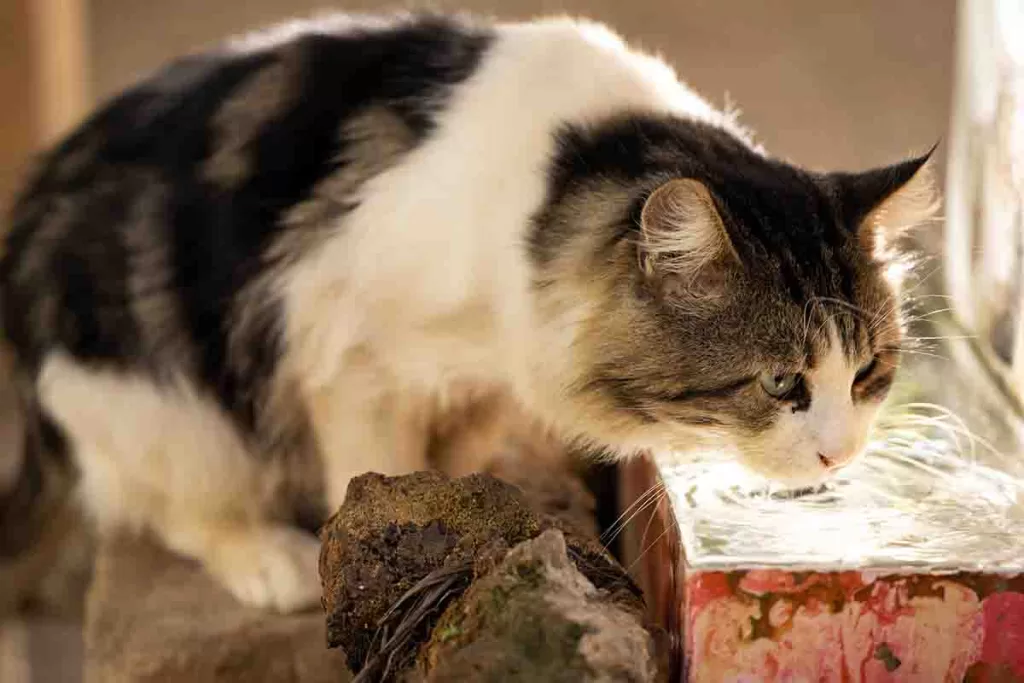
Does Dry Food Make A Cat Thirsty?
Dry food by itself does not increase thirst in a cat, but it does not contribute anything towards its daily water needs.
This popular kitten food, for example, has a moisture content of around 80%, meaning 80% of the content of the can is water. The dry kitten food, from the same manufacturer, has only 8% moisture content.
So a cat that is eating wet cat food is getting some its needed water from its food and will need to drink less water than a cat who is eating only dry kibble.
Why Do Cats Drink Too Much Water?
There are three general categories for reasons that cats drink water excessively. These are: behavioral, compensatory, and medical.
Behavioral Reasons for Cats Drinking Excessively
There are various behavioral reasons why cats may drink more water than usual. The most frequent causes include:
- Stress: Cats may drink more water if they are experiencing stress or anxiety. This can be due to a change in their environment, such as moving to a new home or the introduction of a new pet.
- Boredom: Cats may drink more water out of boredom, especially if they do not have enough stimulation or activities to keep them occupied.
- Behavioral disorders: Certain behavioral disorders, such as obsessive-compulsive disorder or anxiety disorders, can cause cats to drink more water than usual.
Cats that are drinking excessively due to behavior issues will usually exhibit other symptoms as well, such as increased vocalizing, destructive behaviors, excessive grooming or changes in their daily routine.
Compensatory Reasons For Drinking Excessively
Compensatory means that the cat is drinking water to make up for a decrease in their body’s ability to conserve and/or utilize fluids.
The most common type of compensatory polydipsia is from water loss. Cats can lose water in hot environments from sweating or panting, or through vomiting and diarrhea.
The body wants to replace the lost fluids. The water loss results in thirst, which will likely last under the body’s water is once again balanced. During this time the cat will be seen to be drinking more than normal.
Medical Reasons For Cats Drinking Excessively
There are a number medical reasons why cats may drink excessively. These include:
- Kidney disease: Chronic kidney disease is a common in older cats as well as some specific cat breeds, and can cause increased thirst and urination.
- Diabetes: Cats diagnosed with diabetes may have an increase in thirst because of the elevated levels of sugar present in their blood. Consequently, they may urinate more often, which can cause dehydration and other related health issues.
- Hyperthyroidism: Hyperthyroidism is a condition in which the thyroid gland produces too much thyroid hormone. This can lead to symptoms such as increased thirst and hunger, along with weight loss, vomiting, and diarrhea.
- Urinary tract infections: Cats with urinary tract infections may drink more water than usual. Your cat may experience other symptoms of a urinary tract infection such as the need to urinate often, difficulty urinating, and presence of blood in the urine.
- Cushing’s disease: With Cushing’s disease, the adrenal glands produce too much cortisol, a hormone that helps regulate metabolism. Symptoms of this may include increased thirst, hunger, and urination, as well as weight gain and hair loss.
- Liver disease: Cats with liver disease might have increased water intake as a result of toxin accumulation in their body, along with symptoms that could include fatigue, vomiting, and yellowing of the skin and eyes (jaundice).
If your cat is drinking more water than usual, it’s crucial to speak with a veterinarian. They can identify the root cause and recommend a suitable treatment plan. The treatment plan may involve medication, dietary alterations, or surgery, depending on the underlying condition.
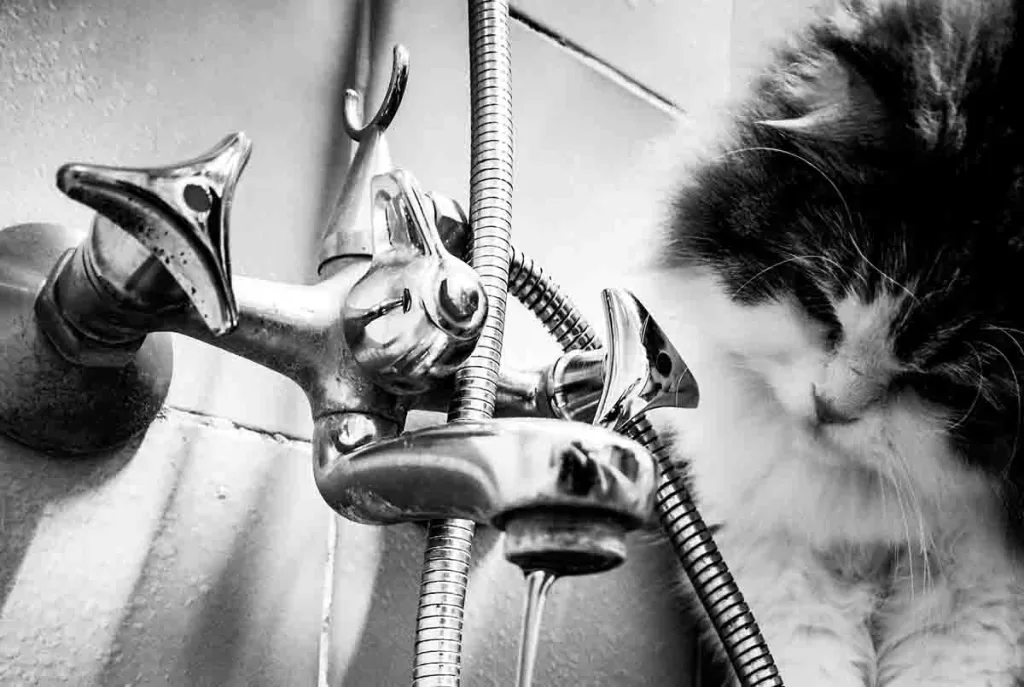
How Do I Know If My Cat Is Drinking Too Much Water?
Here are some of the things you should look for if you think your cat is drinking more than normal:
- Increased frequency of urination: If your cat is drinking more water than usual, they will likely need to urinate more frequently as well. In fact, polyuria (excessive urination) almost always goes hand-in-hand with polydipsia.
- Large volumes of urine: Cats who are drinking too much water may produce large volumes of urine when they do go to the litter box. Check the litter box daily to see if there are very frequent or very large pees present.
- Water bowls empty frequently: If you find yourself refilling your cat’s water bowl more often than usual, this may be an indication that they are drinking more water. You can monitor this by measuring how much you give your cat daily, and how much is left over. Don’t forget to add in the water content of wet foods.
- Increased thirst: If your cat seems to be seeking out water more frequently, such as drinking from the sink or toilet bowl, this may be a sign of excessive thirst.
Should I Limit How Much Water My Cat Drinks?
The only scenario where you would want to limit your cat’s access to water is if it is solely a behavioral issue.
Otherwise, it is important not to restrict the amount of water your cat has access to as excessive thirst can be a symptom of an underlying medical condition which will probably be worsened by water restriction.
I recall one patient where we could find no medical reason for its excessive drinking. After we ruled out medical reasons, all that was left was behavioral reasons.
The owner took the water bowl away overnight, and provided just the appropriate amount of water during the day which seemed to resolve the issue.
Conclusion
In this article, we discussed why cats may drink more water than usual. This can be compensatory or behavioral in nature, or due to various medical conditions that can lead to increased water intake, such as hyperthyroidism, urinary tract infections, Cushing’s disease and liver disease.
If you think your cat is drinking too much water, monitor your cat’s daily water consumption so that you can be certain. Excessive thirst in cats is often a sign of a serious medical problem, so it is important to speak with a veterinarian if your cat is drinking more water than usual.
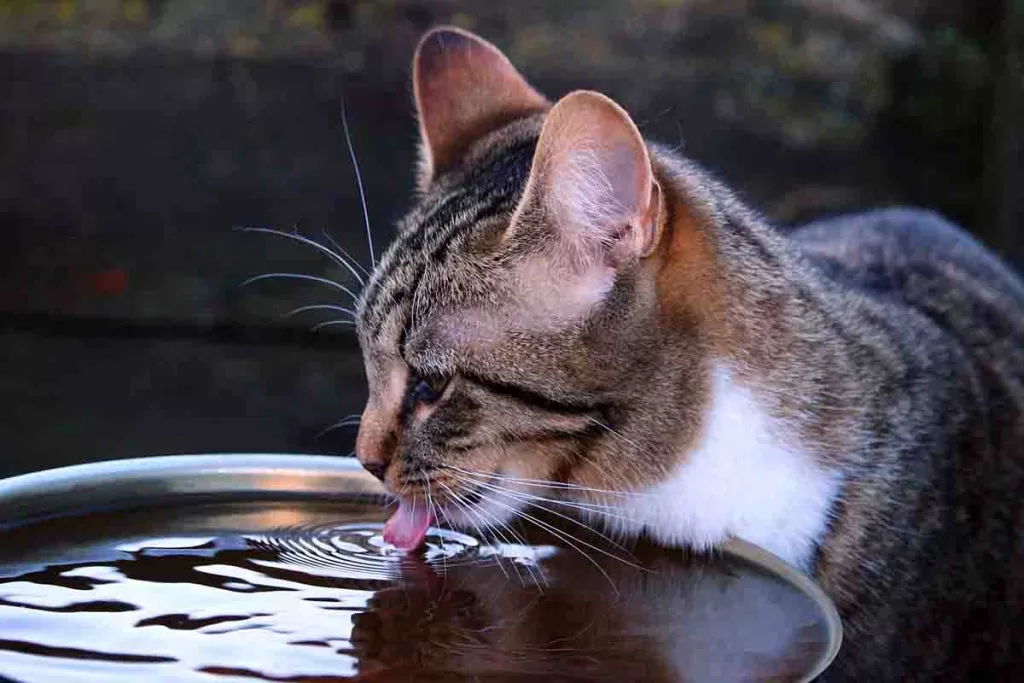
Disclaimer: This article is intended for information purposes only, and does not constitute medical advice. Always consult your veterinarian if you have specific concerns about your pet’s health.

